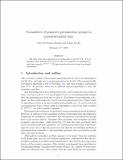Normalisers of primitive permutation groups in quasipolynomial time
Abstract
We show that given generators for subgroups G and H of Sn, if G is primitive then generators for NH(G) may be computed in quasipolynomial time, namely 2O(log^3 n). The previous best known bound was simply exponential.
Citation
Roney-Dougal , C M & Siccha , S 2020 , ' Normalisers of primitive permutation groups in quasipolynomial time ' , Bulletin of the London Mathematical Society , vol. 52 , no. 2 , pp. 358-366 . https://doi.org/10.1112/blms.12330
Publication
Bulletin of the London Mathematical Society
Status
Peer reviewed
ISSN
0024-6093Type
Journal article
Description
Funding: Isaac Newton Institute for Mathematical Sciences for support and hospitality during the programme “Groups, Representations and Applications: New perspectives”, when work on this paper was undertaken. This work was supported by EPSRC grant number EP/R014604/1.Collections
Items in the St Andrews Research Repository are protected by copyright, with all rights reserved, unless otherwise indicated.

